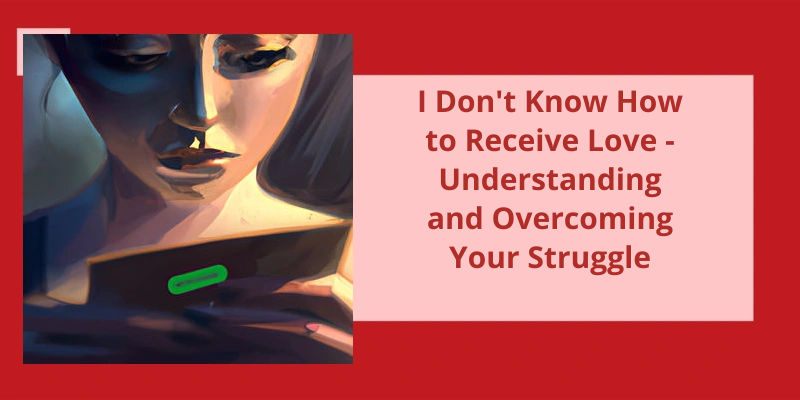As human beings, we all crave love and affection. However, some of us find it difficult to receive love due to various reasons, such as past trauma, negative self-image, or fear of vulnerability. Receiving love requires vulnerability, which can be challenging for those of us who struggle with it. It's essential to become aware of our feelings when receiving affection to understand why it's difficult for us. Talking openly with our loved ones about our struggles is a vital step towards making progress. We need to recognize how we prefer to receive love and communicate it with our loved ones. Seeking the help of a professional can also be beneficial in dealing with deep-seated issues related to receiving love. Ultimately, accepting that we’re worthy of love is crucial in overcoming this hurdle and leading a fulfilling life.
Why Am I Unable to Receive Love?
One reason we may struggle to receive love is due to past experiences of hurt or betrayal. When we’ve been hurt in the past, it can be difficult to trust and let down our guard to allow someone new to come into our lives. We may fear potential pain and avoid opening ourselves up to potential love from others. This can lead to self-sabotage and missed opportunities for connections.
Another reason we may struggle to receive love is due to our own beliefs and self-worth. If we’ve a negative self-image or hold onto negative self-talk, we may believe we aren’t deserving of love and push it away. This can become a self-fulfilling cycle, as the more we push love away, the more evidence we see to support our negative beliefs.
External factors may also impact our ability to receive love. If we were raised in an environment where love was conditional or shown sparingly, we may not have learned how to receive love in a healthy way. We may not even be aware of what healthy love looks and feels like, leading us to reject it or dismiss it when it does come our way.
Certain personality traits may also make it difficult for us to receive love. For example, if we’ve a tendency towards perfectionism or have a strong need for control, we may struggle with accepting help or love from others. We may feel that we need to do everything ourselves, and see asking for help or receiving love as a sign of weakness.
Lastly, we may struggle to receive love due to the current state of our relationships. If we’re in a toxic or unhealthy relationship, we may avoid receiving love from our partner in order to protect ourselves. We may have learned to associate love with pain and feel that by rejecting love, we’re preventing future hurt. It’s important to recognize when a relationship is truly unhealthy and seek help in order to break free from negative patterns and allow for healthy and loving connections in the future.
Healing Strategies and Techniques to Help Individuals Learn to Receive Love and Improve Their Relationships
- Practicing mindfulness and self-awareness
- Identifying and understanding attachment styles
- Cultivating self-love and self-compassion
- Learning effective communication skills
- Seeking therapy or counseling
- Engaging in activities that bring joy and fulfillment
- Setting boundaries and practicing assertiveness
- Forgiving oneself and others
- Developing a support system of friends and family
- Working on personal growth and self-improvement
As we come to realize the significance of receiving love, we open ourselves up to a deeper understanding and connection with those around us. It allows us to find comfort in vulnerability and experience a profound sense of trust and security within our relationships. Let’s explore further the importance of giving and receiving love in our lives.
What Is Receiving or Giving Love?
It’s crucial to understand that receiving love isn’t a sign of weakness but rather a sign of strength. When we open ourselves up to allowing someone to love us, we give ourselves the gift of vulnerability and trust. It’s important to remember that trust is fundamental to any healthy relationship, and trusting someone with our hearts and well-being can be a deeply empowering experience.
Similarly, giving love can also be an incredibly powerful experience. When we give love, we allow ourselves to be generous and selfless. This act can bring great joy and satisfaction as we witness the happiness and contentment of those we love. It’s important to remember, however, that we should never give love with the expectation of receiving something in return. Instead, love should be given freely and unconditionally.
Ultimately, love is a complex and multifaceted experience that can take many forms. It isn’t only about romantic love or familial love, but also about the love we’ve for our friends, our community, and ourselves. Loving oneself can be one of the most challenging aspects of love, yet it’s essential if we’re to give and receive love in a healthy and meaningful way.
Exploring Different Forms of Love Languages and How They Impact Relationships
- Words of Affirmation
- Acts of Service
- Receiving Gifts
- Quality Time
- Physical Touch
The concept of love is one that’s been studied and analyzed by many over the years. From philosophers to poets, the idea of whether it’s better to give love or receive love has long been a topic of discussion. Some argue that giving love is the key to receiving it, while others believe that it’s all about the way you receive it. Regardless of which side you fall on, it’s clear that love is a powerful force that can bring people together in ways that they never thought possible.
Is It Better to Give Love or Receive Love?
But when you love someone, you see beyond those surface differences and connect on a much deeper level. Giving love isn’t just about romantic love, it spans across all relationships. It’s a key ingredient in true happiness and fulfillment in life.
There are many benefits to giving love. It creates a positive energy that affects both the giver and the receiver. It helps to build trust and strengthen relationships. It also releases happy hormones in the brain, making you feel good and reducing stress levels. Loving relationships have even been shown to boost immune systems and increase longevity.
However, receiving love is also important. It allows us to feel appreciated and valued, which can boost self-esteem and confidence. Being able to accept love can also help with forming deep connections and intimacy with others. It’s important to remember that receiving love doesn’t mean being dependent on someone else for happiness, but rather being open to allowing others to contribute to our happiness.
It’s not a competition or a choice between one or the other. They’re simply different sides of the same coin. It’s about finding balance and recognizing the value in both. When you give love freely, it often comes back to you in unexpected ways. When you can receive love openly, it deepens your connections with others and allows for greater happiness and fulfillment. So, whether you’re giving or receiving love, always remember the importance of both.
How to Cultivate a Balance Between Giving and Receiving Love in Relationships, Friendships, and Daily Life.
- Practice active listening when engaging with others
- Be present in the moment and attentive to their needs
- Show appreciation through kind words and gestures
- Offer support when they need it without overstepping boundaries
- Be open and honest in communication to prevent misunderstandings
- Take time for your own self care and personal growth
- Set boundaries for yourself and others to maintain a healthy balance
- Celebrate each other’s successes and milestones
- Forgive and let go of grudges to avoid resentment
- Remember to show love for yourself as well
Ultimately, receiving love allows us to flourish as individuals, providing us with a sense of security, belonging, and purpose. In this article, we’ll delve deeper into the various benefits of receiving love, exploring the ways in which it can transform our lives for the better.
Why Is It Important to Receive Love?
In addition to that, receiving love can also improve your mental health. When you feel loved, your brain releases more of the hormone oxytocin, which has been proven to reduce stress and anxiety levels. This feeling of relaxation and calmness can also lead to better sleep, helping you to wake up feeling refreshed and energized.
But it’s not just about the individual benefits of receiving love. When you feel loved and valued by someone else, you’re more likely to feel a sense of connection to the world around you. This sense of belonging can lead to a greater overall happiness, as well as a desire to engage with others and actively participate in your community.
When you receive love, you may also become more attuned to other peoples emotions and become more empathetic towards them. This can help you to be a more compassionate and understanding partner, friend, and family member. It can be the foundation for a strong, supportive network of relationships that will be there for you through thick and thin.
Receiving love can also give you the courage to step outside of your comfort zone and pursue your dreams. Knowing that you’ve someone in your corner who supports you and believes in you can be incredibly empowering, and may help you to take on challenges that you might have otherwise shied away from. This type of support can be especially important when it comes to taking risks in your personal or professional life.
Overall, the importance of receiving love can’t be overstated. It’s a profound impact on our mental, emotional, and social well-being, and can help us to lead happier, healthier lives. Whether you’re in a committed romantic relationship or have close friendships and family ties, make sure to nurture these connections and express your love and affection regularly. The benefits will be worth it.
The Physical Benefits of Receiving Love, Such as Lower Blood Pressure and a Stronger Immune System
- Lower blood pressure
- Stronger immune system
- Reduced stress levels
- Faster healing times
- Increased longevity
- Improved mental health
- Better sleep quality
- Increased physical activity
- Lower risk of depression
- Improved cardiovascular health
Source: How important is giving and receiving love?..
Expressing love isn’t always easy, and it can be hard to know where to start. Some people show and feel love through gift-giving, while others prefer acts of kindness or quality time spent together. Physical affection and words of affirmation can also be powerful ways to express love. Whether you’re in a romantic relationship or simply showing love to a friend or family member, there are countless ways to express your feelings and make someone feel appreciated and valued.
How Do You Show Love to Someone?
In showing love to someone, there are different ways to do it. One of the most common ways is gift-giving. Some people express their love by showering their loved ones with presents. This can be any form of gift, big or small. However, it’s important to note that this shouldn’t be the only way to show love because it may lead to materialistic gestures and expectations.
Acts of service are another way to express love. By doing something kind or helpful for another person, you show that you care for them. This can be as simple as cooking them a meal or helping them with tasks they find difficult. These acts of service may be small, but they can go a long way in expressing love and appreciation.
Quality time is significant in any relationship. When you spend time with your loved ones, you show them how much you value them. Quality time can involve doing something that both of you enjoy or simply being present with each other. This way, you strengthen your bond and create memories that will last a lifetime.
Physical affection is also a way to express love. Touch is a powerful thing that can convey a deeper level of emotional connection. Holding hands, hugs, and kisses are simple yet effective ways to express feelings of love. However, it’s essential to ensure that you’ve established boundaries and that both parties are comfortable with the level of intimacy.
Lastly, words are powerful tools in expressing love. Saying “I love you” is a simple yet effective way to convey your feelings. Words can also be expressed through compliments, encouragement, and affirmation. By speaking words of love, you create an atmosphere of positivity, build confidence, and show that you care.
Gift-giving, acts of service, quality time, physical affection, and words are all ways to convey love and appreciation. However, it’s important to note that expressing love shouldn’t be limited to these ways. Ultimately, expressing love is about being intentional, understanding your partners love language, and finding creative ways to show that you care.
Different Love Languages and How to Identify and Express Them
Understanding, identifying, and expressing different love languages is an essential factor in maintaining effective relationships. A love language is a specific mode of expressing love and affection, and there are five types of love languages: words of affirmation, acts of service, receiving gifts, quality time, and physical touch. By identifying and expressing the love language of your partner, you can deepen your relationship and promote a stronger bond. To express these love languages, it’s crucial to communicate and listen attentively to your partner’s needs and desires.
Understanding the way in which others express and receive love can help strengthen our relationships. One love language in particular, receiving gifts, can involve a variety of thoughtful gestures that demonstrate affection and appreciation. From small, everyday tokens of love to larger, more extravagant gifts, those who value this language often feel most loved when they receive tangible, meaningful presents from their significant other.
What Are Examples of Love Received?
Love is undoubtedly one of the most powerful emotions in the human experience. It’s a broad term that’s a plethora of meanings and definitions depending on the person you ask. As humans, we all have our unique ways of experiencing and expressing love. For some, love is expressed through physical touch, while others value quality time shared together. For some, it’s expressed through words of affirmation, whereas for others, it’s through acts of service.
Those who receive love through acts of service appreciate gestures of kindness or helpfulness. Examples of how someone with this love language might express love include sending their partner flowers or buying their favorite snack food while at the grocery store. They may go out of their way to make sure their partner is comfortable and happy, such as running an errand or driving them to appointments. Additionally, they might plan special outings or surprise their partner with thoughtful gifts.
People who receive love through quality time value the moments they spend together. They appreciate the undivided attention and effort put in to make sure they’re enjoying each others company. For example, someone who values quality time might enjoy a spontaneous, romantic picnic or a weekend getaway. They might also appreciate being included in routine activities such as cooking dinner together or taking a walk in the park.
Physical touch is another essential aspect of love, and people who receive love through physical affection value the sensation of touch. This can range from holding hands or cuddling to more intimate acts. Expressions of love could include hugs, kisses, or cuddling up while watching a movie. Some people might need more physical affection than others, so it’s essential to communicate to find a balance that works for both parties.
Words of affirmation hold a special place in peoples hearts as they can have a lasting impact on their self-worth. People who receive love through verbal affirmation appreciate kind and genuine words of praise, affirmation, and love. These individuals enjoy hearing why they’re valued and appreciated. Additionally, they might express their love through verbal affirmations, compliments, or praise.
Gift-giving is another valid form of expressing love. People who receive love through gift-giving value the thoughtful and meaningful gifts received from their partners. Gifts are a tangible expression of love and can range from a handwritten letter to an extravagant item. People with this love language might express their love through gift-giving by surprising their partner with a thoughtful and practical gift or a lavish, over-the-top gesture.
Love is a diverse and complex emotion that can take various forms and expressions. The way we express love will differ from person to person, so it’s essential to understand our partners love language to strengthen our relationship. True love is about understanding, compassion, and respect for our partners needs and desires.
Conclusion
In conclusion, receiving love can be difficult, and it’s important to take steps to address this issue in order to lead a fulfilled life. By becoming aware of how you feel when receiving affection, talking openly with loved ones, and noticing how you prefer to receive love, you can begin to make progress in improving your ability to receive love. Seeking the help of a professional is another option for those who need more assistance. Ultimately, it’s important to accept that you’re worthy of love and to believe that you’re deserving of it. Only then can you truly start to overcome any difficulties or obstacles in receiving love. Remember to be kind to yourself and take things one step at a time, and you’ll soon find that love comes naturally and effortlessly into your life.






